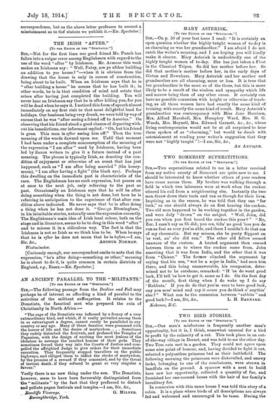- THE IRISH " AFTER."
[TO THE EDITOR OF THE " SFECTATOIt."]
Sin,—Not for the first time our good friend Mr. Punch has fallen into a vulgar error among Englishmen with regard to the use of the word " after " by Irishmen. Mr. Armour this week makes an Irishman say : " Well, Patsy, are ye afther building an addition to yer house ? "—when it is obvious from the drawing that the house is only in course of construction, being about to be built. When an Irishman says that he is "after building a house" he means that he has built it ; in other words, he is in that condition of mind and estate that arises after having just completed the building. You will never hear an Irishman say that he is after• killing you, for you will be dead when be says it. I noticed this form of speech almost immediately on my first visit to that most delightful land for• holidays. Our boatman being very drunk, we were told by way of excuse that he was "after seeing a friend off to America." On observing that his friend stood a good chance of departing with- out his benedictions, our informant replied : " Oh, but hisfriend is gone. This man is after seeing him off." Then the true meaning of the words dawned upon me. Until that moment I had been under a complete misconception of the meaning of the expression "I am after" used by Irishmen, having been led by ,Saxon writers to give it a future instead of a past meaning. The phrase is typically Irish, as denoting the con- dition of enjoyment or otherwise of an event that has just happened, such as "I am after being married" (the honey- moon), "I am after having a fight" (the black eye). Perhaps this dwelling on the immediate past is characteristic of the race. The Englishman has no such expression, hat passes on at once to the next job, only referring to the past as past. Occasionally an Irishman says that he will be after doing something when the thing is not done, but here he is referring in anticipation to the experience of that after con- dition above indicated. He never says that he is after doing a thing when he has not done it. " Geo:.ge, Birmingham," in his inimitable stories.naturally uses the expression correctly. The Englishman's main idea of Irish local colour, both on the stage and in literature, seem; to be to drag in this word "after " and to misuse it. in a ridiculous way. The fact is that the Irishman is not so Irish as we think him to be. When he says that he is after he does not mean that he is before.—I am, [Curiously enough, our correspondent omits to note that the expression, " he's after doing—something or other," meaning he is about to do it, is quite common in certain districts of England, e.g., Essex.—En. Spectator.]










































 Previous page
Previous page